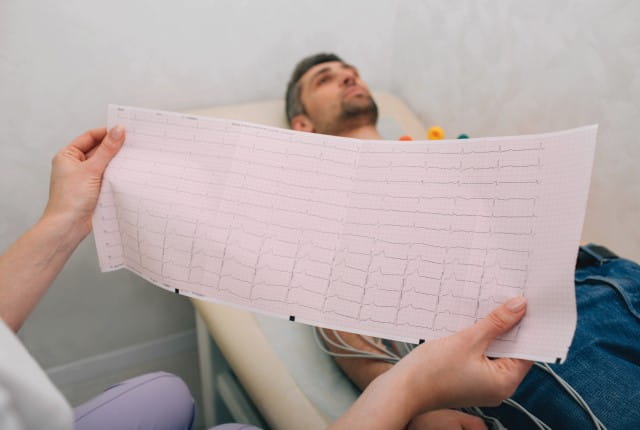Electrocardiogram (ECG)
An electrocardiogram (ECG) is a routine investigation which records the electrical activity of your heart, commonly used to detect problems with your heart.
What is an electrocardiogram?
An electrocardiogram is a routine investigation which records the electrical activity of your heart.
It is one of the most commonly used medical tests in the assessment of cardiovascular disease and is also used to monitor the status of the heart under different conditions.
It is a simple and straightforward procedure usually done in a doctor’s office, a clinic or a hospital room.

Why is an electrocardiogram done?
You might be asked to have a electrocardiogram for the following reasons:
- Fast or slow heart rates
- Irregular heart rhythms
- Abnormal heartbeats
- Areas of the heart with a reduced blood supply
- Previous heart attack
- Delays in the conduction system of the heart
- Coronary artery disease – in which narrowed or blocked arteries cause chest pain or a heart attack
- Monitor ongoing medication and treatment
- Monitor pacemaker activity
- Occupational or Admission requirement: The American Heart Association does not recommend Electrocardiography for the assessment of low risk adults who have no symptoms. However, ECG is a requirement for admission in some schools and recruitment in some professions.
What does an electrocardiogram involve?
The ECG is a simple and painless procedure in which ten stickers (also called electrodes) are attached to the chest.
These stickers are connected up to leads which allow the electrical information to be displayed on the ECG machine.
The patient lies on their back in a relaxed position whilst the tracing is printed out.
The procedure takes approximately ten minutes to complete.
Patients are advised to avoid using oily lotions on the chest or limbs prior to the test.
The physiologist may also be required to shave chest hair before applying the stickers. This is to allow good adhesion to the skin.
Patients should also inform their doctor if they have been on any medication or supplements as this might affect the results of the test.
The results of the test are sent to the referring doctor within 24-48 hours of completion. The doctor will discuss these results with you.
The ECG would provide information on:
- Heart rhythm: ECG would show if the rhythm is regular or irregular
- Heart attack: The patterns on the ECG would show if there has been a previous heart attack or one that is ongoing. It would also give information on the portion of the heart damaged, as well as the extent of the damage.
- Blood and oxygen supply to the heart: If ECG is done while a patient is having symptoms like chest pain, the doctor would be able to tell if the pain is from a reduced blood supply or not.
- ECG can detect structural abnormalities in the heart, such as the enlargement of a heart chamber
- Heart rate: This should be counted normally from the pulse. However, if it is too fast or slow to be counted accurately from the pulse, an ECG would be useful.
There are no major side effects of electrocardiography. However, some people might experience slight discomfort (like plaster being removed) when the electrodes (leads) are removed.
Also, some patients are also allergic to the adhesive present in the electrodes.
Book an appointment today
Call us now for appointment bookings, general queries, and personalised quotes.
Alternatively, you can contact us using our online form
